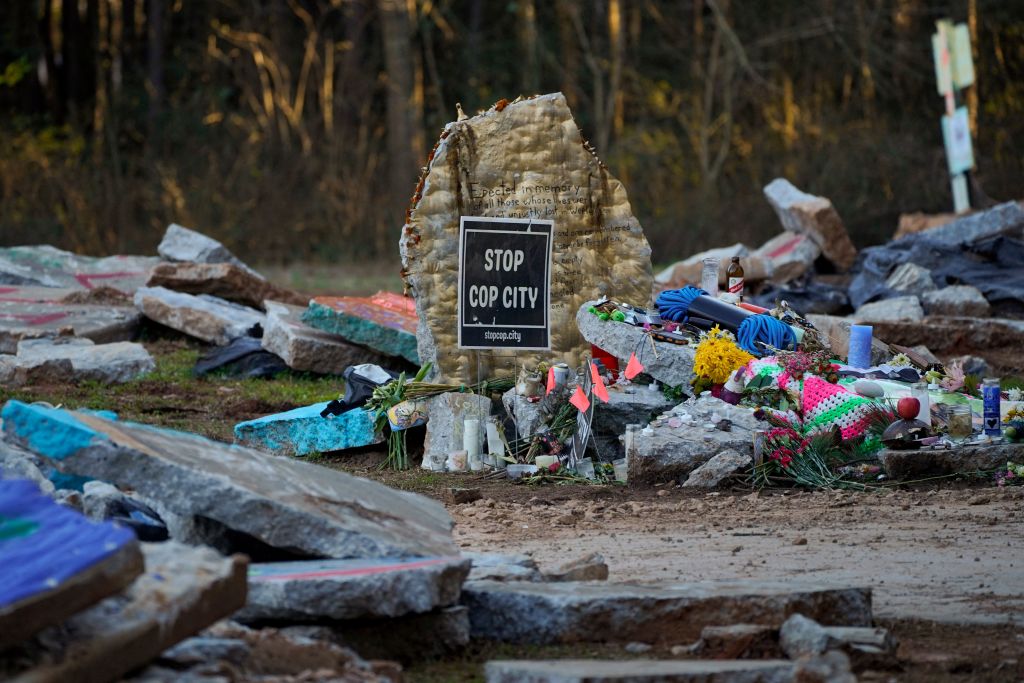
The drama surrounding Atlanta's planned police training facility is about to escalate.
On Monday, protesters against so-called "Cop City" plan to submit about 108,000 signatures to try to force a ballot initiative that could prevent the training facility from being built. The Atlanta City Council approved millions of dollars in taxpayer funds for the project in June after hours of heated public criticism.
It's the latest salvo in the roughly two year long battle that has included violent protests, the police killing of a climate activist, numerous arrests, and sweeping domestic terrorism and racketeering charges against protesters that have alarmed civil rights advocates. The city argues the facility will be important to properly train police and replace worn out facilities. Protesters claim it will empower police violence, in part through creating a mock city to practice urban warfare tactics, and take issue with its 85-acres of construction in an urban forest.
The signatures being submitted to city hall on Monday will force a ballot initiative to vote on the fate of the facility if there are enough valid ones. (The city requires just above 58,000.) “We have more than 100,000 signatures. You have more people in the electorate involved in this than voted for the mayor… but the city council doesn’t want to let people decide,” says DaMareo Cooper, co-executive director of the Center for Popular Democracy, a national organization supporting the ‘Stop Cop City’ movement.
More From TIME
The city had made it more difficult for the signature collection to succeed by outlining a signature match process that would require checking every signature to match what officials have on file. “In an effort to ensure that adequate resources are dedicated to this project, the City of Atlanta… has developed a step-by-step process to conduct the audit of the documents, of which the signature verification process may be a critical element,” said Interim Municipal Clerk Vanessa Waldon in an August 21 statement.
The government argues this is necessary to ensure accuracy but protesters say the policy is rooted in voter suppression and strategically throwing out votes. The Atlanta mayor’s office did not respond to a request for comment.
Ongoing lawsuits could also complicate the ballot initiative process. “We are in a moment of tremendous ambiguity because of litigation,” says Fred Smith, a law professor at Emory University. A lawsuit filed in federal court on July 6 challenged a provision requiring those collecting signatures to be an Atlanta resident. A federal judge ruled that was unconstitutional on July 27—and in doing so he extended the deadline for collecting signatures by 60 days. The protesters continued to collect signatures at that point. On Sept. 1, the 11th Circuit Court of Appeals issued a stay—temporarily freezing the federal court decision.
“You have individuals collecting signatures that a federal court order said they were able to collect, and you have an 11th Circuit opinion that says the injunction is no longer in effect. At some point, a federal court and maybe the 11th Circuit is going to have to figure out what to do with the signatures collected after that point in time. What are our courts going to do with these signatures, given the mismatch between the federal district court order that's no longer in effect and the original state law?” Smith says. It’s unclear whether the stay could endanger the entire petition or apply to votes that came in once the extension period kicked in. “We just don’t know,” Smith says.
In the ballot initiative that anti-Cop City advocates are hoping for, voters would be able to cast votes directly on whether the facility should move forward. But the city has also argued in federal court that the entire ballot initiative process should be scrapped. “They're willing to throw out the entire process in the city of Atlanta's charter that permits these kinds of initiatives,” says Tiffany Roberts, policy director at Southern Center for Human Rights, which has helped connect protesters with legal representation. “They're willing to throw out the entire democratic effort simply because they want to ensure that voters cannot have their say at the ballot box about Cop City.”
Read More: Georgia Is Using a Domestic Terrorism Law Expanded After Dylann Roof Against ‘Cop City’ Protesters
Regardless of whether the signatures are verified or the ballot initiative proceeds, some anti-Cop City organizers are now facing a different challenge. On Sept. 5, Georgia’s Republican Attorney General Chris Carr indicted 61 people on racketeering charges following a state investigation into ‘Cop City’ protests. He accused the defendants of being “militant anarchists” supporting a violent movement. “The 61 defendants together have conspired to prevent the construction of the Atlanta Public Safety Training Center by conducting, coordinating and organizing acts of violence, intimidation and property destruction,” Carr said during a news conference.
Attorney Matt Bass, who represents four of the defendants accused of racketeering, says the use of RICO charges in this way makes protesters “criminally liable for the bad acts of a few.”
“Imagine if you went to a protest and some jerk decided to commit a crime. Under the AG's reading of the law, you are a racketeer merely for being there.” Bass says. “That's plainly unfair. Using the law in this way is unconstitutional and has a significant chilling effect on everyone's rights to protest.”
If enough signatures are verified in the ballot initiative effort, citizens will be able to voice their opinions on the project by exercising a different right: they’ll be able to render a judgment on Cop City with a vote.
More Must-Reads from TIME
- Inside Elon Musk’s War on Washington
- Meet the 2025 Women of the Year
- The Harsh Truth About Disability Inclusion
- Why Do More Young Adults Have Cancer?
- Colman Domingo Leads With Radical Love
- How to Get Better at Doing Things Alone
- Cecily Strong on Goober the Clown
- Column: The Rise of America’s Broligarchy
Write to Sanya Mansoor at sanya.mansoor@time.com